- Home
- Henry James
Henry James Page 16
Henry James Read online
Page 16
Which doubtless too numerous remarks have been determined by my sense of the tenuity of some of my clues: I had begun to count our wavering steps from so very far back, and with a lively disposition, I confess, not to miss even the vaguest of them. I can scarce indeed overstate the vagueness that quite had to attend a great number in presence of the fact that our father, caring for our spiritual decency unspeakably more than for anything else, anything at all that might be or might become ours, would have seemed to regard this cultivation of it as profession and career enough for us, had he but betrayed more interest in our mastery of any art or craft. It was not certainly that the profession of virtue would have been anything less than abhorrent to him, but that, singular though the circumstance, there were times when he might have struck us as having after all more patience with it than with this, that or the other more technical thrifty scheme. Of the beauty of his dissimulated anxiety and tenderness on these and various other suchlike heads, however, other examples will arise; for I see him now as fairly afraid to recognise certain anxieties, fairly declining to dabble in the harshness of practical precautions or impositions. The effect of his attitude, so little thought out as shrewd or as vulgarly providential, but in spite of this so socially and affectionally founded, could only be to make life interesting to us at the worst, in default of making it extraordinarily “paying.” He had a theory that it would somehow or other always be paying enough—and this much less by any poor conception of our wants (for he delighted in our wants and so sympathetically and sketchily and summarily wanted for us) than by a happy and friendly, though slightly nebulous, conception of our resources. Delighting ever in the truth while generously contemptuous of the facts, so far as we might make the difference—the facts having a way of being many and the truth remaining but one—he held that there would always be enough; since the truth, the true truth, was never ugly and dreadful, and we didn’t and wouldn’t depart from it by any cruelty or stupidity (for he wouldn’t have had us stupid,) and might therefore depend on it for due abundance even of meat and drink and raiment, even of wisdom and wit and honour. It is too much to say that our so preponderantly humanised and socialised adolescence was to make us look out for these things with a subtle indirectness; but I return to my proposition that there may still be a charm in seeing such hazards at work through a given, even if not in a systematised, case. My cases are of course given, so that economy of observation after the fact, as I have called it, becomes inspiring, not less than the amusement, or whatever it may be, of the question of what might happen, of what in point of fact did happen, to several very towny and domesticated little persons, who were confirmed in their towniness and fairly enriched in their sensibility, instead of being chucked into a scramble or exposed on breezy uplands under the she-wolf of competition and discipline. Perhaps any success that attended the experiment—which was really, as I have hinted, no plotted thing at all, but only an accident of accidents—proceeded just from the fact that the small subjects, a defeated Romulus, a prematurely sacrificed Remus, had in their very sensibility an asset, as we have come to say, a principle of life and even of “fun.” Perhaps on the other hand the success would have been greater with less of that particular complication or facilitation and more of some other which I shall be at a loss to identify. What I find in my path happens to be the fact of the sensibility, and from the light it sheds the curious, as also the common, things that did from occasion to occasion play into it seem each to borrow a separate and vivifying glow.
As at the Institution Vergnès and at Mr. Pulling Jenks’s, however this might be, so at “Forest’s,” or in other words at the more numerous establishment of Messrs. Forest and Quackenboss, where we spent the winter of 1854, reality, in the form of multitudinous mates, was to have swarmed about me increasingly: at Forest’s the prolonged roll-call in the morning, as I sit in the vast bright crowded smelly smoky room, in which rusty black stove-shafts were the nearest hint of architecture, bristles with names, Hoes and Havemeyers, Stokeses, Phelpses, Colgates and others, of a subsequently great New York salience. It was sociable and gay, it was sordidly spectacular, one was then, by an inch or two, a bigger boy—though with crushing superiorities in that line all round; and when I wonder why the scene was sterile (which was what I took it for at the worst) the reason glooms out again in the dreadful blight of arithmetic, which affected me at the time as filling all the air. The quantity imposed may not in fact have been positively gross, yet it is what I most definitely remember—not, I mean, that I have retained the dimmest notion of the science, but only of the dire image of our being in one way or another always supposedly addressed to it. I recall strange neighbours and deskfellows who, not otherwise too objectionable, were uncanny and monstrous through their possession, cultivation, imitation of ledgers, daybooks, double-entry, tall pages of figures, interspaces streaked with oblique ruled lines that weirdly “balanced,” whatever that might mean, and other like horrors. Nothing in truth is more distinct to me than the tune to which they were, without exception, at their ease on such ground—unless it be my general dazzled, humiliated sense, through those years, of the common, the baffling, mastery, all round me, of a hundred handy arts and devices. Everyone did things and had things—everyone knew how, even when it was a question of the small animals, the dormice and grasshoppers, or the hoards of food and stationery, that they kept in their desks, just as they kept in their heads such secrets for how to do sums—those secrets that I must even then have foreseen I should even so late in life as this have failed to discover. I may have known things, have by that time learnt a few, myself, but I didn’t know that—what I did know; whereas those who surrounded me were all agog, to my vision, with the benefit of their knowledge. I see them, in this light, across the years, fairly grin and grimace with it; and the presumable vulgarity of some of them, certain scattered shades of baseness still discernible, comes to me as but one of the appearances of an abounding play of genius. Who was it I ever thought stupid?—even when knowing, or at least feeling, that sundry expressions of life or force, which I yet had no name for, represented somehow art without grace, or (what after a fashion came to the same thing) presence without type. All of which, I should add, didn’t in the least prevent my moving on the plane of the remarkable; so that if, as I have noted, the general blank of consciousness, in the conditions of that winter, rather tended to spread, this could perhaps have but had for its best reason that I was fairly gorged with wonders. They were too much of the same kind; the result, that is, of everyone’s seeming to know everything—to the effect, a little, that everything suffered by it. There was a boy called Simpson my juxtaposition to whom I recall as uninterruptedly close, and whose origin can only have been, I think, quite immediately Irish—and Simpson, I feel sure, was a friendly and helpful character. Yet even he reeked, to my sense, with strange accomplishment—no single show of which but was accompanied in him by a smart protrusion of the lower lip, a crude complacency of power, that almost crushed me to sadness. It is as if I had passed in that sadness most of those ostensibly animated months; an effect however doubtless in some degree proceeding, for later appreciation, from the more intelligible nearness of the time—it had brought me to the end of my twelfth year; which helps not a little to turn it to prose. How I gave to that state, in any case, such an air of occupation as to beguile not only myself but my instructors—which I infer I did from their so intensely letting me alone—I am quite at a loss to say; I have in truth mainly the remembrance of being consistently either ignored or exquisitely considered (I know not which to call it;) even if without the belief, which would explain it, that I passed for generally “wanting” any more than for naturally odious. It was strange, at all events—it could only have been—to be so stupid without being more brutish and so perceptive without being more keen. Here were a case and a problem to which no honest master with other and better cases could have felt justified in giving time; he would have had at least to be morbidly curious, and I recal
l from that sphere of rule no instance whatever of the least refinement of inquiry. I should even probably have missed one of these more flattering shades of attention had I missed attention at all; but I think I was never really aware of how little I got or how much I did without. I read back into the whole connection indeed the chill, or at least the indifference, of a foreseen and foredoomed detachment: I have noted how at this desperate juncture the mild forces making for our conscious relief, pushing the door to Europe definitely open, began at last to be effective. Nothing seemed to matter at all but that I should become personally and incredibly acquainted with Piccadilly and Richmond Park and Ham Common. I regain at the same time the impression of more experience on the spot than had marked our small previous history.
Pitiful as it looks to these ampler days the mere little fact that a small court for recreation was attached to our academy added something of a grace to life. We descended in relays, for “intermission,” into a paved and walled yard of the scantest size; the only provision for any such privilege—not counting the street itself, of which, at the worst of other conditions, we must have had free range—that I recover from those years. The ground is built over now, but I could still figure, on a recent occasion, our small breathing-space; together with my then abject little sense that it richly sufficed—or rather, positively, that nothing could have been more romantic. For within our limit we freely conversed, and at nothing did I assist with more interest than at free conversation. Certain boys hover before me, the biggest, the fairest, the most worthy of freedom, dominating the scene and scattering upon fifty subjects the most surprising lights. One of these heroes, whose stature and complexion are still there for me to admire, did tricks of legerdemain, with the scant apparatus of a handkerchief, a key, a pocketknife—as to some one of which it is as fresh as yesterday that I ingenuously invited him to show me how to do it, and then, on his treating me with scorn, renewed without dignity my fond solicitation. Fresher even than yesterday, fadelessly fresh for me at this hour, is the cutting remark thereupon of another boy, who certainly wasn’t Simpson and whose identity is lost for me in his mere inspired authority: “Oh, oh, oh, I should think you’d be too proud—!” I had neither been too proud nor so much as conceived that one might be, but I remember well how it flashed on me with this that I had failed thereby of a high luxury or privilege—which the whole future, however, might help me to make up for. To what extent it has helped is another matter, but so fine was the force of the suggestion that I think I have never in all the years made certain returns upon my spirit without again feeling the pang from the cool little voice of the Fourteenth Street yard. Such was the moral exercise it at least allowed us room for. It also allowed us room, to be just, for an inordinate consumption of hot waffles retailed by a benevolent black “auntie” who presided, with her husband’s aid as I remember, at a portable stove set up in a passage or recess opening from the court; to which we flocked and pushed, in a merciless squeeze, with all our coppers, and the products of which, the oblong farinaceous compound, faintly yet richly brown, stamped and smoking, not crisp nor brittle, but softly absorbent of the syrup dabbed upon it for a finish, revealed to me I for a long time, even for a very long time supposed, the highest pleasure of sense. We stamped about, we freely conversed, we ate sticky waffles by the hundred—I recall no worse acts of violence unless I count as such our intermissional rushes to Pynsent’s of the Avenue, a few doors off, in the particular interest of a confection that ran the waffle close, as the phrase is, for popularity, while even surpassing it for stickiness. Pynsent’s was higher up in the row in which Forest’s had its front—other and dearer names have dropped from me, but Pynsent’s adheres with all the force of the strong saccharine principle. This principle, at its highest, we conceived, was embodied in small amber-coloured mounds of chopped cocoanut or whatever other substance, if a finer there be; profusely, lusciously endued and distributed on small tin trays in the manner of haycocks in a field. We acquired, we appropriated, we transported, we enjoyed them, they fairly formed perhaps, after all, our highest enjoyment; but with consequences to our pockets—and I speak of those other than financial, with an intimacy, a reciprocity of contact at any, or at every, personal point, that I lose myself in the thought of.
XVII
I LOSE myself, of a truth, under the whole pressure of the spring of memory proceeding from recent revisitings and recognitions—the action of the fact that time until lately had spared hereabouts, and may still be sparing, in the most exceptional way, by an anomaly or a mercy of the rarest in New York, a whole cluster of landmarks, leaving me to “spot” and verify, right and left, the smallest preserved particulars. These things, at the pressure, flush together again, interweave their pattern and quite thrust it at me, the absurd little fusion of images, for a history or a picture of the time—the background of which I see after all so much less as the harsh Sixth Avenue corner than as many other matters. Those scant shades claimed us but briefly and superficially, and it comes back to me that oddly enough, in the light of autumn afternoons, our associates, the most animated or at any rate the best “put in” little figures of our landscape, were not our comparatively obscure schoolmates, who seem mostly to have swum out of our ken between any day and its morrow. Our other companions, those we practically knew “at home,” ignored our school, having better or worse of their own, but peopled somehow for us the social scene, which, figuring there for me in documentary vividness, bristles with Van Burens, Van Winkles, De Peysters, Costers, Senters, Norcoms, Robinsons (these last composing round a stone-throwing “Eugene,”) Wards, Hunts and tutti quanti—to whose ranks I must add our invariable Albert, before-mentioned, and who swarm from up and down and east and west, appearing to me surely to have formed a rich and various society. Our salon, it is true, was mainly the street, loose and rude and crude in those days at best—though with a rapid increase of redeeming features, to the extent to which the spread of micaceous brown stone could redeem: as exhibited especially in the ample face of the Scotch Presbyterian church promptly rising just opposite our own peculiar row and which it now marks for me somewhat grimly a span of life to have seen laboriously rear itself, continuously flourish and utterly disappear. While in construction it was only less interesting than the dancing-academy of Mr. Edward Ferrero, slightly west of it and forming with it, in their embryonic stage, a large and delightfully dangerous adjunct to our playground, though with the distinction of coming much to surpass it for interest in the final phase. While we clambered about on ladders and toyed with the peril of unfloored abysses, while we trespassed and pried and pervaded, snatching a scant impression from sorry material enough, clearly, the sacred edifice enjoyed a credit beyond that of the profane; but when both were finished and opened we flocked to the sound of the fiddle more freely, it need scarce be said, than to that of the psalm. “Freely” indeed, in our particular case, scarce expresses the latter relation; since our young liberty in respect to church-going was absolute and we might range at will, through the great city, from one place of worship and one form of faith to another, or might on occasion ignore them all equally, which was what we mainly did; whereas we rallied without a break to the halls of Ferrero, a view of the staringly and, as I supposed dazzlingly, frescoed walls, the internal economy, the high amenity, the general æsthetic and social appeal, of which still hangs in its wealth before me. Dr. McElroy, uplifting tight-closed eyes, strange long-drawn accents and gaunt scraggy chin, squirming and swaying and cushion-thumping in his only a shade more chastely adorned temple, is distinct enough too—just as we enjoyed this bleak intensity the more, to my personal vision, through the vague legend (and no legend was too vague for me to cherish) of his being the next pastor in succession to the one under whom our mother, thereto predirected by our good greatgrandfather, Alexander Robertson already named, who was nothing if not Scotch and Presbyterian and authoritative, as his brave old portrait by the elder Jarves attests, had “sat” before her marriage; the marriage s
o lamentedly diverting her indeed from this tradition that, to mark the rueful rupture, it had invoked, one evening, with the aid of India muslin and a wondrous gold head-band, in the maternal, the Washington Square “parlours,” but the secular nuptial consecration of the then Mayor of the city—I think Mr. Varick.
We progeny were of course after this mild convulsion not at all in the fold; yet it strikes me as the happy note of a simple age that we were practically, of a Sunday at least, wherever we might have chosen to enter: since, going forth hand in hand into the sunshine (and I connect myself here with my next younger, not with my elder, brother, whose orbit was other and larger) we sampled, in modern phrase, as small unprejudiced inquirers obeying their inspiration, any resort of any congregation detected by us; doing so, I make out moreover, with a sense of earnest provision for any contemporary challenge. “What church do you go to?”—the challenge took in childish circles that searching form; of the form it took among our elders my impression is more vague. To which I must add as well that our “fending” in this fashion for ourselves didn’t so prepare us for invidious remark—remark I mean upon our pewless state, which involved, to my imagination, much the same discredit that a houseless or a cookless would have done—as to hush in my breast the appeal to our parents, not for religious instruction (of which we had plenty, and of the most charming and familiar) but simply for instruction (a very different thing) as to where we should say we “went,” in our world, under cold scrutiny or derisive comment. It was colder than any criticism, I recall, to hear our father reply that we could plead nothing less than the whole privilege of Christendom and that there was no communion, even that of the Catholics, even that of the Jews, even that of the Swedenborgians, from which we need find ourselves excluded. With the freedom we enjoyed our dilemma clearly amused him: it would have been impossible, he affirmed, to be theologically more en règle. How as mere detached unaccompanied infants we enjoyed such impunity of range and confidence of welcome is beyond comprehension save by the light of the old manners and conditions, the old local bonhomie, the comparatively primal innocence, the absence of complications; with the several notes of which last beatitude my reminiscence surely shines. It was the theory of the time and place that the young, were they but young enough, could take publicly no harm; to which adds itself moreover, and touchingly enough, all the difference of the old importances. It wasn’t doubtless that the social, or call it simply the human, position of the child was higher than to-day—a circumstance not conceivable; it was simply that other dignities and values and claims, other social and human positions, were less definite and settled, less prescriptive and absolute. A rich sophistication is after all a gradual growth, and it would have been sophisticated to fear for us, before such bright and vacant vistas, the perils of the way or to see us received anywhere even with the irony of patronage. We hadn’t in fact seats of honour, but that justice was done us—that is that we were placed to our advantage—I infer from my having liked so to “go,” even though my grounds may have been but the love of the exhibition in general, thanks to which figures, faces, furniture, sounds, smells and colours became for me, wherever enjoyed, and enjoyed most where most collected, a positive little orgy of the senses and riot of the mind. Let me at the same time make the point that—such may be the snobbery of extreme youth—I not only failed quite to rise to the parental reasoning, but made out in it rather a certain sophistry; such a prevarication for instance as if we had habitually said we kept the carriage we observably didn’t keep, kept it because we sent when we wanted one to University Place, where Mr. Hathorn had his livery-stable: a connection, this last, promoted by my father’s frequent need of the aid to circulate (his walks were limited through an injury received in youth) and promoting in turn and at a touch, to my consciousness, the stir of small, the smallest remembered things. I recall the adventure, no infrequent one, of being despatched to Mr. Hathorn to bespeak a conveyance, and the very air and odour, the genial warmth, at a fine steaming Irish pitch, of the stables and their stamping and backing beasts, their resounding boardedness, their chairs tipped up at such an angle for lifted heels, a pair of which latter seek the floor again, at my appeal, as those of big bearded Mr. Hathorn himself: an impression enriched by the drive home in lolling and bumping possession of the great vehicle and associated further with Sunday afternoons in spring, with the question of distant Harlem and remoter Bloomingdale, with the experience at one of these junctures of far-away Hoboken, if it wasn’t Williamsburg, which fits in fancifully somewhere; when the carriage was reinforced by a ferry and the ferry by something, something to my present vision very dim and dusty and archaic, something quite ragged and graceless, in the nature of a public tea-garden and ices. The finest link here, however, is, for some reason, with the New York Hotel, and thereby with Albany uncles; thereby also with Mr. Hathorn in person waiting and waiting expensively on his box before the house and somehow felt as attuned to Albany uncles even as Mrs. Cannon had subtly struck me as being.

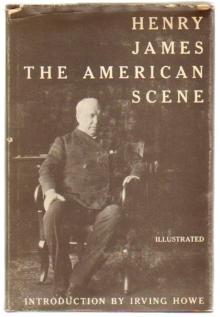 The American
The American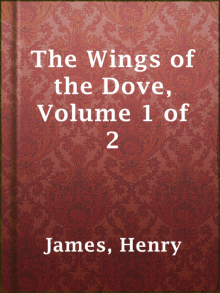 The Wings of the Dove, Volume 1 of 2
The Wings of the Dove, Volume 1 of 2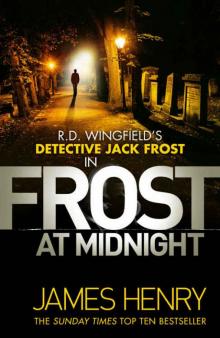 Frost at Midnight
Frost at Midnight Morning Frost
Morning Frost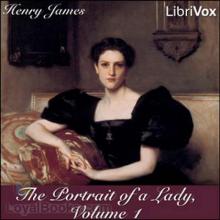 The Portrait of a Lady — Volume 1
The Portrait of a Lady — Volume 1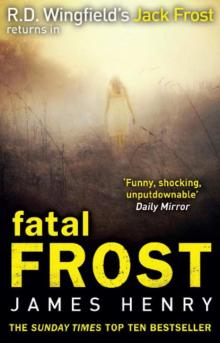 Fatal Frost
Fatal Frost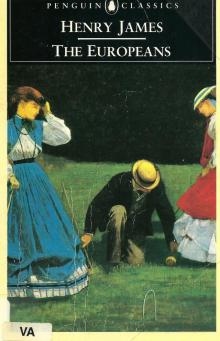 The Europeans
The Europeans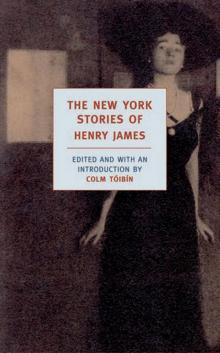 The New York Stories of Henry James
The New York Stories of Henry James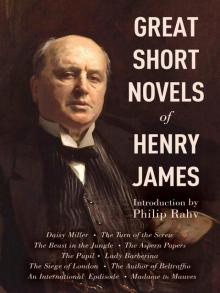 Great Short Novels of Henry James
Great Short Novels of Henry James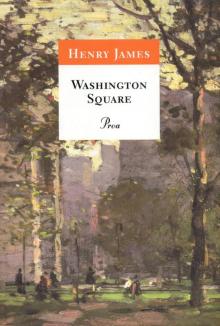 Washington Square
Washington Square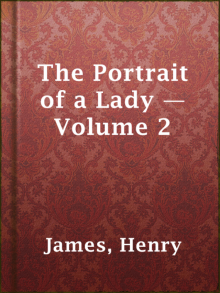 The Portrait of a Lady — Volume 2
The Portrait of a Lady — Volume 2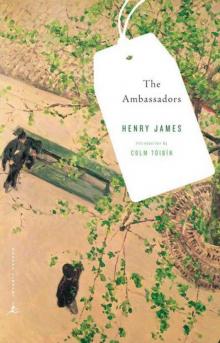 The Ambassadors
The Ambassadors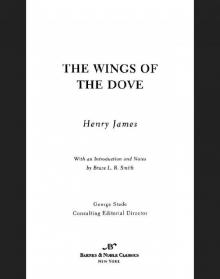 The Wings of the Dove
The Wings of the Dove The Princess Casamassima (Classics)
The Princess Casamassima (Classics)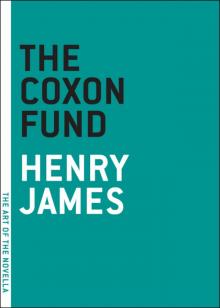 The Coxon Fund
The Coxon Fund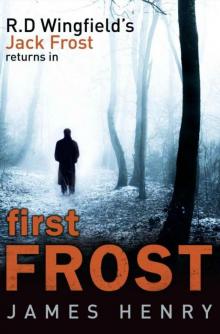 First Frost
First Frost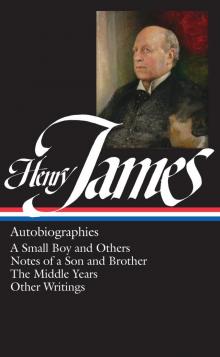 Henry James
Henry James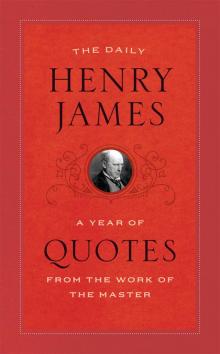 The Daily Henry James
The Daily Henry James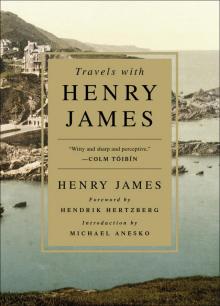 Travels With Henry James
Travels With Henry James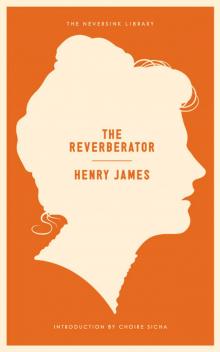 The Reverberator: A Novel
The Reverberator: A Novel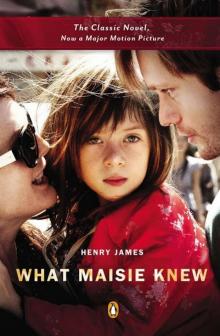 What Maisie Knew (Henry James Collection)
What Maisie Knew (Henry James Collection)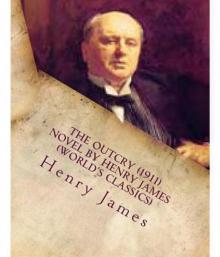 The Outcry
The Outcry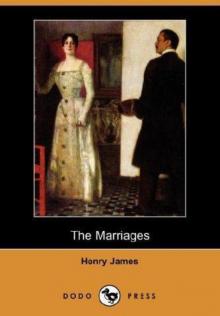 The Marriages
The Marriages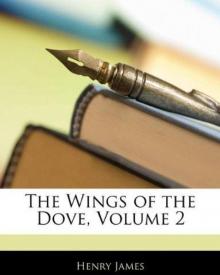 The Wings of the Dove, Volume 2
The Wings of the Dove, Volume 2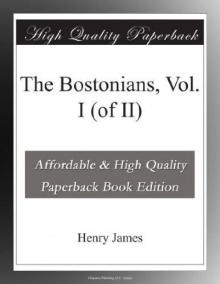 The Bostonians, Vol. I
The Bostonians, Vol. I The Outcry: -1911
The Outcry: -1911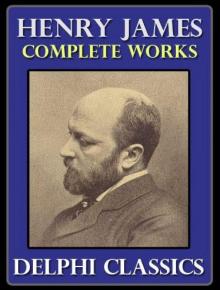 The Complete Works of Henry James
The Complete Works of Henry James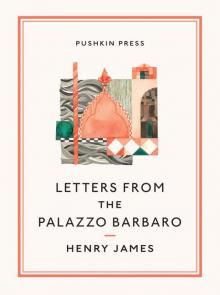 Letters from the Palazzo Barbaro
Letters from the Palazzo Barbaro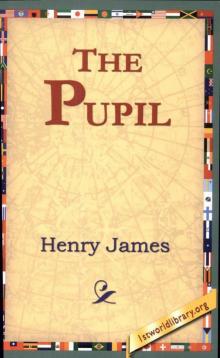 The Pupil
The Pupil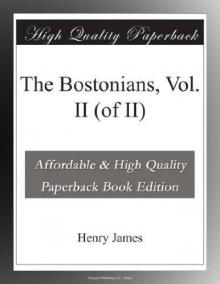 The Bostonians, Vol. II
The Bostonians, Vol. II Pandora
Pandora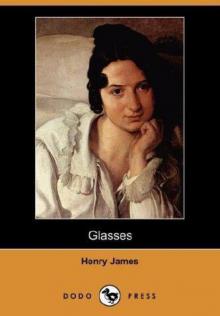 Glasses
Glasses The Princess Casamassima
The Princess Casamassima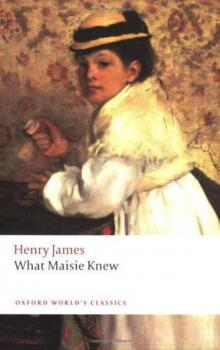 What Maisie Knew
What Maisie Knew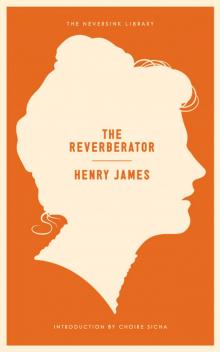 The Reverberator
The Reverberator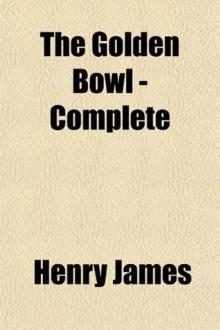 The Golden Bowl - Complete
The Golden Bowl - Complete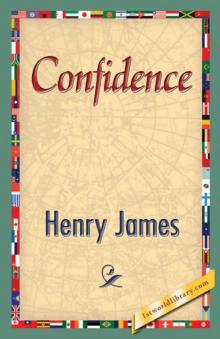 Confidence
Confidence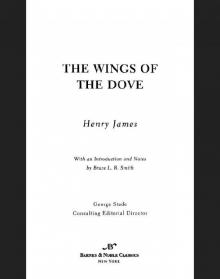 Wings of the Dove (Barnes & Noble Classics Series)
Wings of the Dove (Barnes & Noble Classics Series)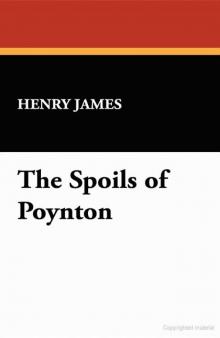 The Spoils of Poynton
The Spoils of Poynton